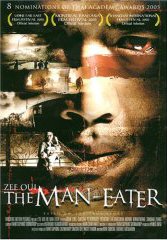
Celebrated for their ability to break thresholds of cultural taboo and challenge the stale conservative dictates of on-screen morality, contemporary Asian horror also subverts previously honored aesthetic principles. While such successful examples of contemporary Asian horror as Ringu are recognized for its subtlety chilling atmosphere and long-haired female wraiths, this form only represents the 'Kwaidan' style of cinematic storytelling. On the other end of the spectrum are films that blend the clever characterization and mood of these 'quiet' horrors with audacious violence. These attacks against expectation seek to disturb more openly, picking at our cultural and individual fear of not only bodily harm, violence, and death but -- and more disturbingly -- emotional illness and the horrible consequences of madness. Man Eater is just such a film, embracing its sordid content and nihilistic approach with grim relish. Seeking no friends, this film understands the importance of disturbing its audience -- not only through visuals but by thematic context. Dreary, repugnant, and terrifying, this mind-threat dares you to enjoy it!
In a plot that devotes as much effort to establishing character as steadily increasing set-pieces of violence, Man Eater focuses on Zee Qui, a drifting, rootless man out of prospects and with no emotional ties, searching for a better life. He leaves his native China behind for Thailand, seeking the economical and cultural opportunities reputedly waiting for ambitious men. Arriving without friends or money, he finds himself attacked by harsh circumstances, poverty, and hostility. When even his health turns against him, and he develops tuberculosis, his mind -- already strained-- snaps! In a cruel twist of fate, he becomes convinced that the solution to his survival is to be had by devouring the hearts of young children.
The moral landscape of this decidedly unfriendly thriller is seeped in decay, desperation, and rage -- a smoldering, slow anger that explodes with superb menace. Tragedy plays as crucial a role as exploitation, merging the delights of the psycho-thriller (with its emphasis on character and emotional suspense) with the raw titillation of splatter (which delights in physical carnage). Zee is something of a modern Elizabeth Bathory, with the terror of his actions rooted in the depths of his misery. Tackling two extremely taboo topics -- child violence and cannibalism -- the direction (and story in general) makes a sensationalistic subject both horrifying and depressing. Hardly a 'date' movie, the depressing context in which the action occurs lends further humanistic tension. Undeniably successful as a hard-boiled psychological horror feature, Man Eater is also an impressive tragedy of conscience and fate. Most impressive is the director's ability to throw our own fears and hungers, instincts and morals into question. Zee is both victim and victimizer. Admirable tension is evoked by both a story and performance that challenges us to both sympathize with his early turmoil and detest him for his final actions.
Man-Eater is presented in anamorphic widescreen (1.85:1) in a clean, polished print. Free from grain, the picture's colors are vivid if subdued, helping maintain the psychologically dark mood of the story. Audio is in Dolby (Thai language) with additional English subtitles. Extras are scant if enjoyable, consisting of the Original Trailer (with subs), an Image Gallery, and Trailers for other Tokyo Shock features.
Review by William P. Simmons
| Released by Tokyo Shock |
| Region 1 - NTSC |
| Not Rated |
| Extras : see main review |